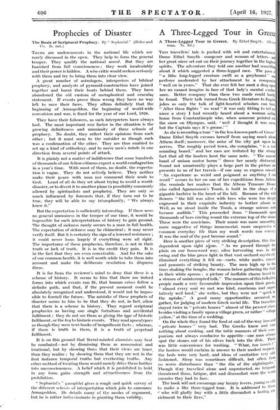Prophecies of Disaster
THERE are undercurrents in the national life which are rarely discussed in the open. They help to form the general temper. They qualify the national moral. But they are banished from full consciousness ; they work incalculably and their power is hidden. A wise critic would reckon seriously with them and try to bring them into clear view.
A great number of astrologers, interpreters of biblical prophecy, and analysts of pyramid-construction have joined together and burnt their boats behind them. They have abandoned the old custom of metaphorical and oracular statement. If events prove them wrong they have no way left to save their faces. They affirm definitely that the beginning of Armageddon, the beginning of world-wide convulsion and war, is fixed for the year of our Lord, 1928.
They have their followers, as such interpreters have always had. The most important new factor in the situation is the growing definiteness and unanimity of these schools of prophecy. No doubt, they reflect their opinions from each other ; but it must seem to the outsider as though each was a confirmation of the other. They are thus enabled to set up a kind of orthodoxy, and to move men's minds in one direction from several points of attack.
It is plainly not a matter of indifference that some hundreds of thousands of our fellow-citizens expect a world-conflagration in a year's time. With most of them, no doubt, the expecta- tion is vague. They do not actively believe. They neither make their peace with man nor commend their souls to God. Least of all do they set about trying to avoid a world- disaster, or to divert it to another plane (a possibility commonly allowed by spiritualists and prophets). They are only so much influenced by forecasts that, if they turn out to be true, they will be able to say triumphantly, We always knew it."
But the expectation is sufficiently interesting. If there were no general uneasiness in the temper of our time, it would be impossible for such interpretations of history to gain ground. The thought of sickness rarely occurs to a man in full health. The expectation of sickness may be chimerical ; it may never verify itself. But it is certainly the sign of a lowered resistance ; it could never loom largely if everything were all right. The importance of these prophecies, therefore, is not in their truth or lack of truth. It is in the credit they gain. It is in the fact that they are even conceivable. And for the sake of our common health, it is well worth while to take them into account and make the deliberate resolution to disprove them.
It is far from the reviewer's mind to deny that there is a scheme of history. It seems to him that there are indeed forms into which events can fit, that human crises follow a definite path, and that, if the present moment could be absolutely recognized and understood, it would not be impos- sible to foretell the future. The mistake of these prophets of disaster seems to him to be that they do not, in fact, allow that there is a scheme in history. They regard scriptural prophecies as having one single fortuitous and accidental fulfilment ; they do not see them as giving the type of histOric fulfilment, or the key to historic events. They read apocalypseS as though they were text-books of insignificant facts ; whereas, if there is truth in them, it is a truth of perpetual fulfilment.
It is on this ground that literal-minded alarmists may best be combated—not by dismissing them as nonsensical and irrational, but by showing ther... that their views arc truer. than they realize ; by showing them that they arc not in the first instance 'temporal truths but everlasting truths. Any other method of treating them would merely drive them further into unconsciousness. A belief which it is prohibited to hold. in. any form gains strength and attractiveness from the prohibition.
" Sepharial's " pamphlet gives a rough and quick survey of the different schools of interpretation which join to announce Armageddon. He details many: of the modes of argument, but he is rather indiscriminate in granting them validity.


































 Previous page
Previous page